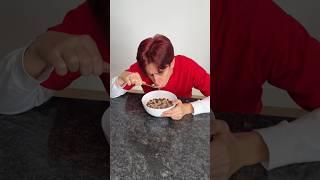
All the Different 3d printing Filaments Explained!
Комментарии:

Brilliant and informative video. Thank you. You could make a table with pros and cons of all discussed filaments.
Ответить
Not all filament is plastic, so I thought there would be more to it
Ответить
Hi. I got a dumb question. When you say drybox, I immediately picture a dehydrator. Seeing as they both do roughly the same thing, is it necessary to buy a drybox if I already have access to a dehydrator?
Ответить
Good video but I wish the pictures showed the filament you were talking about at that given moment
Ответить
Only video where i approve of background noise. Cuz i know you got a printer going in the back :D
Ответить
Should’ve included relatable images
But details were helpful thanks

I am a beginner looking for the best filament for a project. It needs to be rigid, uv and water resistant, and a relatively popular filament. I already have lot of PLA, and was wondering if there are things to finish those print to make them last, or If there are better, easier types.
Ответить
Thanks for the great video. What type of filament do you recommend for the car's decorative parts that are strong and last long in the sun?
Ответить
Hi, long time. I wish you mentioned the common household plastics, HDPE,PETE,PVC. Thank you, great advice
Ответить
Thanks
Ответить
So I know a good amount of ppl like to print enclosures for circuit boards like their pis or arduino projects. I personally have been wondering how ESD safe these plastics are, although I know there are specific ones marketed for this.
Ответить
The xyz printer was telling me I could not use the PLA filament for this project that I need to use Anti-Bact filament what was it talking about?
Ответить
Hi guys I only have an ender 3v2 right now it has a glass heated bed (lol but I'm sure you knew that) and I would like to print items for my machine shop, items like tool holders, switch enclosures etc, some times machine oil can get on the items but not always, can you suggest something for me?
Ответить
Gold and Silver filament???
Ответить
I was excited when you mentioned PLA can be damaged by prolonged sunlight. I figured you’d give the specifics for each type, but when we got to ABS, no mention… 😢 I have some outdoor things I want to do, and it’s be nice to know… (I’m going to watch the rest, see if there is any UV/Outdoor information.
Update: hmmm, maybe ASA…

Any recommendations on a beginner, I want to buy a 3d printer, but I don’t know which one is over priced and something simple. I mainly want to craft some desk organizers for my ikea desk.
Ответить
Concise and clear info. Thanks for taking the time.
Ответить
Time code to where he talks about the metal filament please? Anyone?
Ответить
This video is exactly what I was looking for, well done! Thanks for the Lego joke!
Ответить
HI, I'm new to 3D printing, i got the Ender-3 v2, i have a PLA filament (i think need to check)
i printed something similar to a syringe, but the surface is kind of rough and not smooth,(printed 2 part,a cylinder and a shaft, and its noisy and not smooth moving when the shaft is moving inside the cylinder)
is there a filament that can be some how be smooth like a syringe plastic, maybe also transparent (but not have too) that works well with the Ender3 v2 and it as precision like PLA or more ?
Thanks

Thank you
Ответить
Now the only thing you have not talked about how toxic they can be?
Ответить
What is about PCL Filaments
Ответить
What about PP,,LD& HD
Ответить
Would loved to have the timeline for all filaments. Great vid
Ответить
You can only use 15 pictures in your video.... ok
Ответить
Sorry to be that guy but your audio quality is absolute crap. Sounds like you were recording it with your phone on handsfree . I had to turn on the subtitles because I couldn't understand you half of the time between the mike quality and the vocal fry. I mean thank you for the video man, just buy a microphone and put a bit of work on the equalizer and sound levels.
Ответить
Thank you for this. Just want info without skits or jokes. Definitely will subscribe.
Ответить
Excellent video! Which of these filaments are food safe?
Ответить
What are the filaments used to do 3d printed molds for injection molding process , pls tell us?
Ответить
Appreciate the post, but it took me a while to figure out it's just a random slideshow going on in the background and doesn't represent the filament you're talking about, like I would have expected.
Ответить
Thanks so much! So I got my new Bambu Lab printer with its PLA, PETG, PE-BLAH-BLAH, Filler Support PLA, BLAH and I’m going what the heck do I do with this?? So this video was an excellent intro to filaments and very helpful. In addition to strength, durability, hydro whatever… you might also talk about fumes. I’m guessing that some of these could produce toxic fumes when printing?
Ответить
Tanks so much
I really understood and learn a lot about the different types of film, now I filled More comfortable on whatever prints I’ll print and with what film I Need to use. ***

A few more things to consider that is going on in the background which can affect the filament and printed parts. The raw polymer is compounded by different vendors with different additives. Some vendors use all virgin polymers and some use virgin + recycled polymer. The additives used in the compounding will vary from compounder to compounder and also vary by color in order to disperse the pigment properly or protect the polymer from degradation. Processing during compounding is done in the melt and then extruded/pelletized before extruded again to form filament (usually by a different vendor). So the polymer sees multiple thermal cycles above the melt and can degrade. So it is wise to look at each vendor/polymer/color combination as unique before investing huge $$ in a print even though the spools may have similar data (extrusion temp for example). Eventually if the volume is high enough, there will be ASTM tests to standardize these materials. There may be batch to batch variations from a vendor that may only be noticed during/after printing which will be difficult to trace.
Ответить
Awesome! Thanks!
Ответить
Thanks for your video. For a newbie, you explained it well.
Ответить
Thanks! great vid. Which of these UV resistant filaments > ASA, PCTG & PETG are 'strongest'? Speaking of those which UV resistant filament would you recommend for functional parts... eg a shed door handle?
Ответить
Simple and to the point. That's refreshing.
Ответить
Anybody know what material I should use for a homemade socket? Like a 3/8 drive automotive socket that would hold a little torque before the drive side rounding/crushing in?
Ответить
I don't have a favorite filament, but I am writing a comment.
Ответить
now I know why I have plastic in my balls.
Ответить
Bought my first printer from a guy and he gave me 2 basically identical brandless spools of ABS, 1 brand new and 1 almost used up. I used the latter first and the bed temperature had to stay in 105 for a good result. And when I switched to the other spool, it constantlly overheated so I lowered the bed temperature to 90 and it turned out much better. I suspect these are not ABS at all because I printed them with no enclosure and inside a room with AC and a ceiling fan right on top of where I put the printer, even though it does emmit a not very pleasant odor.
I guess if you want consistent results in your prints, stick to notable brands and a certain kind of material.

Helped a lot, but the video seems like a school of project. You can really tell there’s a script behind it. Just feedback.
Ответить
Bro gave us the military analysis on types of filament. Just needed the old timey projector click between each slide
Ответить
Very boring to have so much pictures sliding out of contact behind what is said. An old school blog article would be better to deal with your content.
Ответить
Basics for future reference:
PETG: temps: 225-260c
Bed temps 60-70c
Hydroscopic: needs dry box

The two owls you show, one is rough the other shiny. is this due to sanding and polishing or is it a choice of material and printing settings?
Ответить

























